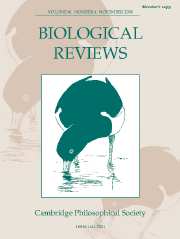Crossref Citations
This article has been cited by the following publications. This list is generated based on data provided by
Crossref.
Arthur, K M
Vejlupkova, Z
Meeley, R B
and
Fowler, J E
2003.
Maize ROP2 GTPase Provides a Competitive Advantage to the Male Gametophyte.
Genetics,
Vol. 165,
Issue. 4,
p.
2137.
Moyle, Leonie C.
Olson, Matthew S.
and
Tiffin, Peter
2004.
PATTERNS OF REPRODUCTIVE ISOLATION IN THREE ANGIOSPERM GENERA.
Evolution,
Vol. 58,
Issue. 6,
p.
1195.
Herrera, Carlos M.
2004.
Distribution ecology of pollen tubes: fine‐grained, labile spatial mosaics in southern Spanish Lamiaceae.
New Phytologist,
Vol. 161,
Issue. 2,
p.
473.
Moyle, Leonie C.
Olson, Matthew S.
and
Tiffin, Peter
2004.
PATTERNS OF REPRODUCTIVE ISOLATION IN THREE ANGIOSPERM GENERA.
Evolution,
Vol. 58,
Issue. 6,
p.
1195.
Bernasconi, G.
Ashman, T.-L.
Birkhead, T. R.
Bishop, J. D. D.
Grossniklaus, U.
Kubli, E.
Marshall, D. L.
Schmid, B.
Skogsmyr, I.
Snook, R. R.
Taylor, D.
Till-Bottraud, I.
Ward, P. I.
Zeh, D. W.
and
Hellriegel, B.
2004.
Evolutionary Ecology of the Prezygotic Stage.
Science,
Vol. 303,
Issue. 5660,
p.
971.
Armbruster, W. Scott
and
Gobeille Rogers, Denise
2004.
Does pollen competition reduce the cost of inbreeding?.
American Journal of Botany,
Vol. 91,
Issue. 11,
p.
1939.
Chan, Kai M. A.
and
Levin, Simon A.
2005.
LEAKY PREZYGOTIC ISOLATION AND POROUS GENOMES: RAPID INTROGRESSION OF MATERNALLY INHERITED DNA.
Evolution,
Vol. 59,
Issue. 4,
p.
720.
Till‐Bottraud, I.
Joly, D.
Lachaise, D.
and
Snook, R. R.
2005.
Pollen and sperm heteromorphism: convergence across kingdoms?.
Journal of Evolutionary Biology,
Vol. 18,
Issue. 1,
p.
1.
Chan, Kai M. A.
and
Levin, Simon A.
2005.
LEAKY PREZYGOTIC ISOLATION AND POROUS GENOMES: RAPID INTROGRESSION OF MATERNALLY INHERITED DNA.
Evolution,
Vol. 59,
Issue. 4,
p.
720.
HEDHLY, A.
HORMAZA, J. I.
and
HERRERO, M.
2005.
Influence of genotype‐temperature interaction on pollen performance.
Journal of Evolutionary Biology,
Vol. 18,
Issue. 6,
p.
1494.
Kermicle, Jerry L
2006.
A Selfish Gene Governing Pollen-Pistil Compatibility Confers Reproductive Isolation Between Maize Relatives.
Genetics,
Vol. 172,
Issue. 1,
p.
499.
Carlson, Jane E.
and
Harms, Kyle E.
2006.
The Evolution of Gender-Biased Nectar Production in Hermaphroditic Plants.
The Botanical Review,
Vol. 72,
Issue. 2,
p.
179.
Kruszewski, Leah J.
and
Galloway, Laura F.
2006.
Explaining Outcrossing Rate in Campanulastrum americanum (Campanulaceae): Geitonogamy and Cryptic Self‐Incompatibility.
International Journal of Plant Sciences,
Vol. 167,
Issue. 3,
p.
455.
Marshall, Diane L.
Shaner, Marieken G. M.
and
Oliva, Jon-Paul
2007.
EFFECTS OF POLLEN LOAD SIZE ON SEED PATERNITY IN WILD RADISH: THE ROLES OF POLLEN COMPETITION AND MATE CHOICE.
Evolution,
Vol. 61,
Issue. 8,
p.
1925.
Aizen, Marcelo A.
and
Harder, Lawrence D.
2007.
EXPANDING THE LIMITS OF THE POLLEN-LIMITATION CONCEPT: EFFECTS OF POLLEN QUANTITY AND QUALITY.
Ecology,
Vol. 88,
Issue. 2,
p.
271.
Carlson, Jane E.
2007.
Male‐biased nectar production in a protandrous herb matches predictions of sexual selection theory in plants.
American Journal of Botany,
Vol. 94,
Issue. 4,
p.
674.
ARISTA, MONTSERRAT
and
ORTIZ, PEDRO LUIS
2007.
Differential gender selection on floral size: an experimental approach using Cistus salvifolius.
Journal of Ecology,
Vol. 95,
Issue. 5,
p.
973.
Shaner, Marieken G. M.
and
Marshall, Diane L.
2007.
How robust is nonrandom mating in wild radish: do small pollen loads coupled with more competing pollen donors lead to random mating?.
American Journal of Botany,
Vol. 94,
Issue. 2,
p.
266.
Lankinen, Åsa
and
Kiboi, Samuel
2007.
Pollen Donor Identity Affects Timing of Stigma Receptivity inCollinsia heterophylla(Plantaginaceae): A Sexual Conflict during Pollen Competition?.
The American Naturalist,
Vol. 170,
Issue. 6,
p.
854.
LANKINEN, Å.
and
ARMBRUSTER, W. S.
2007.
Pollen competition reduces inbreeding depression in Collinsia heterophylla (Plantaginaceae).
Journal of Evolutionary Biology,
Vol. 20,
Issue. 2,
p.
737.




